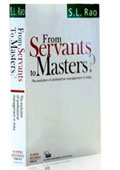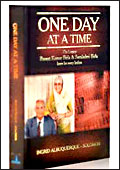 |
FROM SERVANTS TO MASTERS
By S.L. Rao
Global Business Press
Pp: 426
Price: Rs 395 |
The title is a bit misleading.
The book is really a well compiled history of management practices
at what the media likes to call India Inc. It traces the evolution
of business and management in this country, from the times of the
East India Company (which first applied, albeit without realising
it, the principles of corporate management in India and, possibly,
the world) to the current era, when management is almost emerging
as a profession.
Of particular interest is the chapter on the birth, evolution
and demise of the managing agency system, which, despite its drawbacks,
was instrumental in laying the country's industrial foundation.
S.L. Rao details how some of the biggest managing agencies like
Andrew Yule, Duncan Brothers, Bird & Co., Shaw Wallace, Birla
Brothers and Tata Sons & Co., among several others, developed
the jute, cotton, tea, shipping and coal mining industries from
scratch.
The book also details how company managements changed from a
chummy "whites only" club to one where Indian managers
came into their own (in the 1960s and 1970s) to the current times
when many Indian managers head large multinational corporations.
Rao cites the examples of Prakash Tandon, the first Indian chief
of Hindustan Lever (now Hindustan Unilever), to whom this book
is dedicated, and of Ajit Haksar, the first Indian chief of ITC,
to highlight the loneliness and discrimination that Indian managers
faced at these "boxwallah" companies.
Today's managers will probably laugh at this, but the fact is
that till only a decade-and-a-half ago, a manager's worth lay
not in his ability to produce value, but in his proximity to politicians
and bureaucrats who held the power of life and death over Corporate
India-they decided who would produce what, where and how much.
From there, to today's semi-laissez faire environment has been
an exciting journey for the professional manager. Rao's book,
which marks the 50th anniversary of the All India Management Association,
records all the milestones, pitfalls and victories along the way.
 |
ONE DAY AT A TIME
By Ingrid Albuquerque-Solomon
Berean Bay
Pp: 340
Price: 980
|
A Life Well Lived
An atypical biography of B.K. Birla and his wife, Saraladevi.
I feel there is no joy in my present lifestyle. There is no
struggle. Mornings and evenings come and go-time slips by and
goes waste. Industries have been started by my father where hundreds
of people are working...I am also one of them." Not the sort
of entry you are likely to find in the personal diary of a scion
of India's best known business family. But Basant Kumar Birla
is no ordinary industrialist. A son of legendary Ghanshyam Das
Birla, father to Aditya Vikram Birla, and grandfather to Kumar
Mangalam Birla, B.K. is perhaps one of the least controversial
industrialists in the country. And people who've met him say that
he is a genuinely scholarly person, who was happy to manage Century
Textiles on behalf of the extended family, and let his son Aditya
Vikram create the Birla powerhouse.
B.K. babu, as he is popularly called, wrote about his own life
in his autobiography A Rare Legacy: Memoirs of B K Birla. In One
Day at a Time, it's a vastly different B.K. babu that one gets
to meet-a spiritual Birla. At 86 years of age, the question that
B.K. babu ponders over, as Albuquerque-Solomon writes, is this:
"What is the greatest gift you can hand down to your children
and grandchildren? It's not financial, emotional, physical or
material. It is spiritual." And B.K. babu and his wife Saraladevi
are using this book "as an Ethical Will, a concrete method
for passing on their values". To that extent, the author,
who's also written a book on Aditya Vikram Birla's battle with
cancer (Not Allowed to Cry), does a good job of bringing out the
most intimate beliefs of Birla and his wife.
Read it if you have an inclination towards things spiritual.
If not, you may still want to read it to discover a more private
side to B.K. babu's personality. In the book, the author asks,
is business enterprise a profession that turns good men into devils?
If B.K. babu is anything to go by, then not.
|






